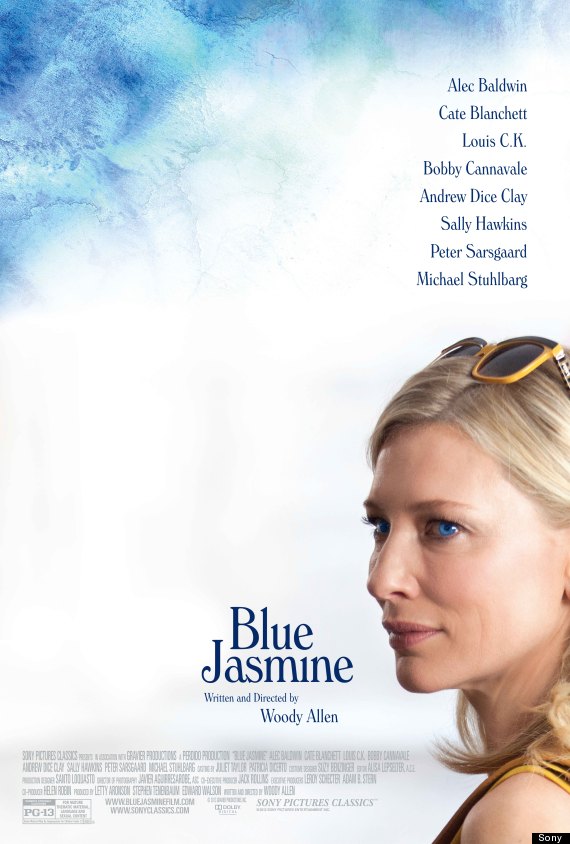
Director: Woody Allen
Writer: Woody Allen
When I saw Woody Allen's To Rome with Love last year, I stated in my review that the veteran's career would not be sunk by one dud of a film. And that's exactly what To Rome with Love was—a tired, half-hearted dud. Thankfully, my suspicions were confirmed with Blue Jasmine: one of the strongest films Allen has made in the past 15 years. Many would declare that that's no mean feat, as Allen hasn't produced many quality films in that period of time. That's not my point. My point is that this 77-year-old man, who could happily retire if he wanted to, has salvaged the willpower to follow a stinker (To Rome with Love) with a very solid picture in Blue Jasmine. It shows that he cares, and that he isn't just making films "because he can". Blue Jasmine is by no means a perfect film, nor one that will blow you away (unless there's some personal resonance with the characters). Rather, it's a tight, well-executed film that doesn't waste time in saying what it has to say.
The film's premise is a simple one: Jasmine (Cate Blanchett), once a wealthy socialite who enjoyed a decadent New York existence, has hit bottom in almost every aspect of her life. She flies to San Francisco to start anew with her adopted sister, Ginger (Sally Hawkins), who has never known the same privilege as Jasmine. Ginger has recently divorced her husband Augie, and is now dating the blue-collar Chili (Bobby Cannavale). Jasmine's arrival upsets the dynamic at Ginger's house, as the sisters have opposing values and expectations. Through seamless flashbacks, we see Jasmine's foreboding interactions with her husband, Hal (Alec Baldwin). Allen toys with the film's chronology through these smooth transitions between past and present, which in turn reflect Jasmine's deteriorating grip on reality. Jasmine decides to pursue a career in interior design, which requires her to take up computer classes (due to computer illiteracy). To pay for the classes, she agrees to a job as a dental receptionist. None of these endeavours ring true. Jasmine is not accustomed to choosing. We get the sense that none of these aspirations stem from passion, but rather a desire to matter.

There's a striking sadness that underpins the entire film. We sympathise with Jasmine not because of the events that befall her, but because she brings all of her troubles upon herself. Her comfortable life in New York has led her to believe that any state of emotional disturbance is a temporary one. Jasmine's denial of her own shortcomings is what's saddest of all. She is always projecting the blame onto others, as though they "just don't get it". A major idea I gathered from the film is that people cannot exist on an objective level. We may think we have our own concrete personalities, but we actually adapt to our surroundings, depending on our company. These facades we wear are ultimately futile because we cannot find a way to marry them all. Furthermore, the film argues that we are burdened by the shackles of expectation. Ginger may not be completely satisfied in her relationship with Chili, but when she has a tryst with Al (Louis C.K), she realises that dating someone from a higher social class for the sake of conformity is not worth it. Jasmine is encased by a vicious self-fulfilling prophecy. She has always been the elite one, and even when she falls from grace, there's this painful insistence that things aren't as bad as they seem. Her psychosis defies this illusion. Things are as bad as they seem.
Let's talk about Cate Blanchett. The most obvious comparison to make is between Jasmine and Blanche DuBois from A Streetcar Named Desire. I was more fascinated by Blanchett as an actress and her channeling of Gena Rowlands. Now, I'm not sure if this was intentional or unintentional, or if others have noticed it. I couldn't see past it. Blanchett reminded me so much of Rowlands in her mannerisms, intonation, and even physical appearance. In fact, I made this observation when I first saw the trailer. This is not a complaint. This is praise. I could imagine Blanchett playing Rowlands' role in a Cassavetes film such as Opening Night or A Woman Under the Influence. The parallel runs even deeper. In one scene, Jasmine says, "There's only so many traumas a person can withstand until they take to the streets and start screaming." Well, as soon as that line was uttered, I immediately thought of this classic Rowlands scene from A Woman Under the Influence:
Comparisons aside, Blanchett is phenomenal in Blue Jasmine. There is always a look in her eyes that suggests she is simultaneously detached and completely immersed in her surroundings. We never know when her breaking point will come, which reminds me of Hitchcock's famous differentiation between surprise and suspense, whereby suspense depends on prior knowledge of an impending threat, and surprise comes without warning. Watching Cate Blanchett in Blue Jasmine is a suspenseful experience.
Here's hoping that Woody Allen can crank out more gems like this for many years to come!
4/5 stars.
No comments:
Post a Comment